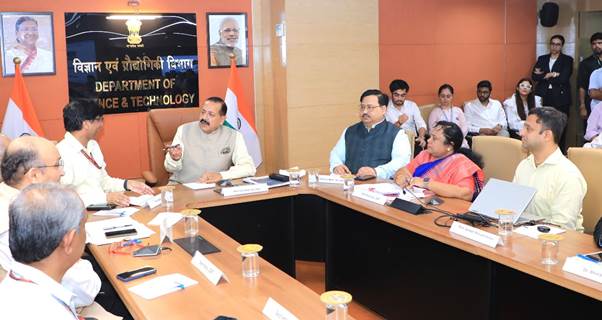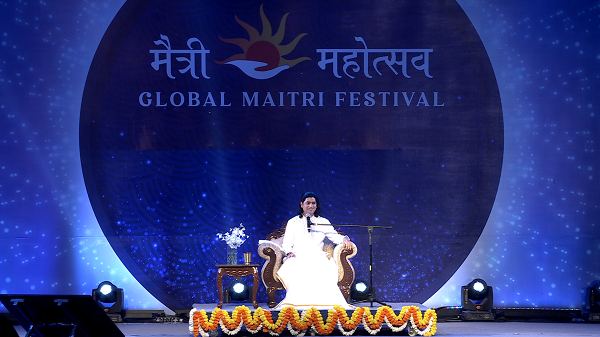New Delhi, Delhi, 23rd of October, 2024 : Integration between Public and Private sectors is crucial to future growth, emphasized Dr. Jitendra Singh, Union Minister of State (Independent Charge) for Science and Technology, Minister of State (Independent Charge) for Earth Sciences, MoS PMO, Department of Atomic Energy, Department of Space, Personnel, Public Grievances and Pensions, in a pivotal session during the National Learning Week, jointly organized for all level of employees of all the Science Ministries and Departments.

The Union Minister highlighted how the convergence of public sector requirements, private sector innovations, and government efforts is shaping the next phase of technological advancement in the country. Referring to BharatGen, India’s indigenously developed large language model (LLM), and the growing role of AI in governance, Dr.Jitendra Singh stressed that such collaborative efforts are vital to drive innovation, improve public service delivery, and ensure India remains competitive in the global AI landscape. The Minister noted that harnessing private sector expertise, combined with government initiatives like BharatGen and AI applications, will pave the way for scalable, inclusive, and efficient solutions for the nation’s diverse needs.
Dr. Jitendra Singh further highlighted that the government’s role in this integration is to create an enabling environment that fosters innovation, supports startups, and ensures that technological advancements align with national priorities. “When public demands meet private sector creativity, and government policies facilitate growth, we can achieve scalable and sustainable solutions that benefit the entire country,” the Minister stated. He praised the ongoing collaboration between the public sector and private enterprises in areas like AI and LLMs, which are vital for India’s competitive edge in the global tech landscape.
The session also saw participation from Secretary, Ministry of Science and Technology, Abhay Karandikar, Secretary Biotechnology Dr Rajesh Gokhale and Secretary, Ministry of Earth Sciences, Dr.M.Ravindran, who echoed Dr.Jitendra Singh’s views on the need for a united approach to ensure sustainable growth and innovation across sectors.
BharatGen, an indigenously developed large language model (LLM) tailored for Indian languages, was the focal point of a session organized for employees of the Science Ministries as part of the National Learning Week. The session delved into the practical applications of BharatGen across various sectors, emphasizing its potential to revolutionize public service delivery and enhance citizen engagement. By using India-centric data, BharatGen can generate high-quality text and speech outputs in multiple Indian languages, making it a key tool for promoting digital inclusion in the country.
Experts highlighted how BharatGen can be applied to sectors such as governance, healthcare, and education, helping bridge linguistic gaps and making digital services accessible to a larger segment of India’s population. The model’s ability to understand and respond in regional languages ensures that AI technology is not limited to English speakers, providing a more personalized experience for users. BharatGen’s applications can range from AI-driven customer support for government services to real-time translations and speech-to-text functionalities.
One of the key takeaways from the session was BharatGen’s role in promoting India’s technological independence. Unlike global AI models, BharatGen prioritizes Indian languages and cultural contexts, addressing the unique challenges faced by the country. This AI model aligns with the vision of Atmanirbhar Bharat, ensuring that India retains control over its digital resources while empowering startups, industries, and public institutions to build on the BharatGen framework for various innovations.

In a dedicated session on Artificial Intelligence (AI) during National Learning Week, employees from the Science Ministries were introduced to the transformative potential of AI in governance and public service delivery. The session highlighted how AI could be used to improve decision-making processes, streamline administrative tasks, and enhance citizen-centric services. By leveraging AI technologies, government departments can increase efficiency, reduce human error, and create more responsive systems to meet the evolving needs of the public.
The session emphasized the ethical and responsible use of AI, particularly in safeguarding data privacy and maintaining transparency in government functions. Experts outlined the importance of developing AI frameworks that ensure fairness and accountability, particularly when dealing with sensitive data in sectors such as healthcare and governance. Participants were encouraged to explore AI applications in areas like predictive analysis for policy-making and automating routine tasks to focus on more strategic issues.
A key highlight of the session was the importance of building AI models suited to India’s unique requirements. By focusing on regional languages and culturally relevant contexts, AI can better serve India’s diverse population. The participants were urged to continuously upgrade their AI skills, ensuring that India remains competitive globally while fostering innovation and inclusivity in public services.
Concluding the session, Dr. Jitendra Singh reiterated the government’s commitment to strengthening partnerships between the public and private sectors, emphasizing that such collaborations are not just beneficial but necessary for India’s long-term growth. He expressed confidence that with sustained efforts and a shared vision, India will continue to lead in technological advancements that are both inclusive and forward-looking.










More Stories
MMGEIS Students Take A Step Forward In Strengthening The Geospatial Community.
Maitribodh Parivaar Concludes Maitri Mahotsav – A Global Celebration Of Spiritual Empowerment And Social Progress.
Vaidyaratnam To Collaborate With Johns Hopkins University.